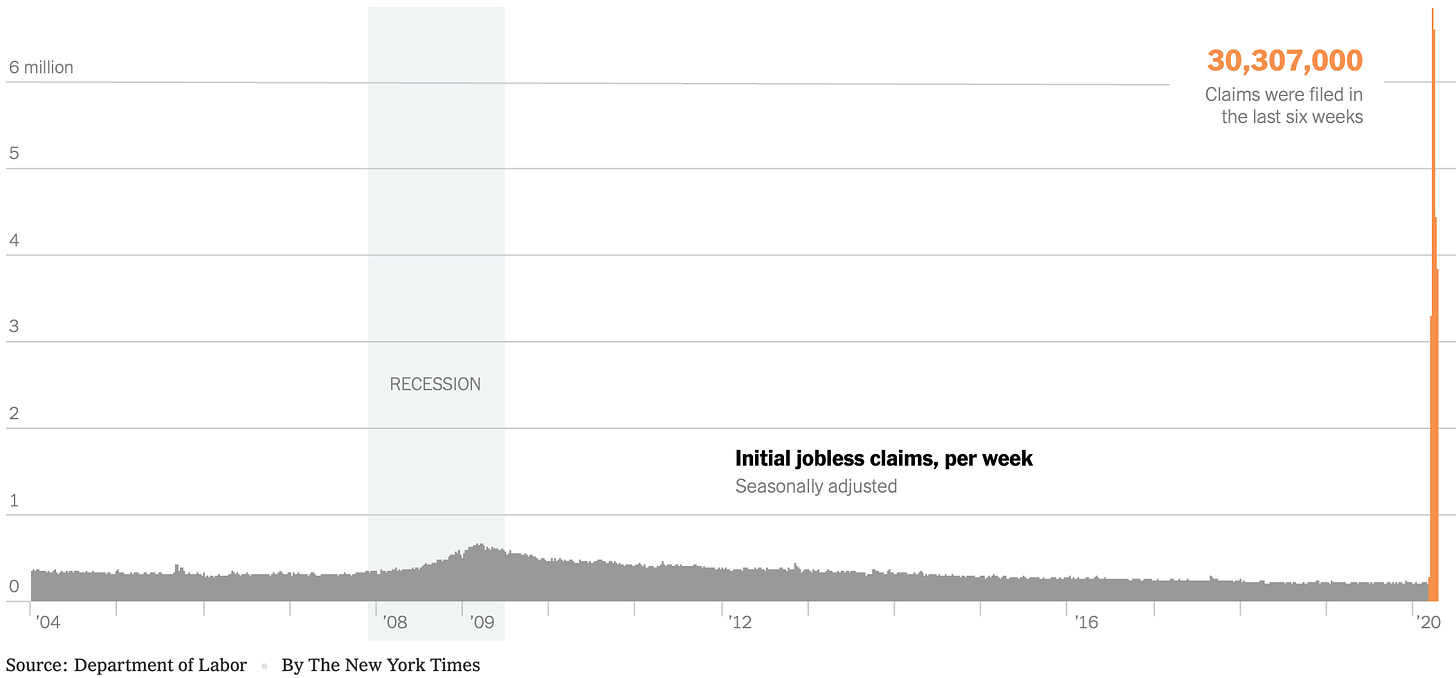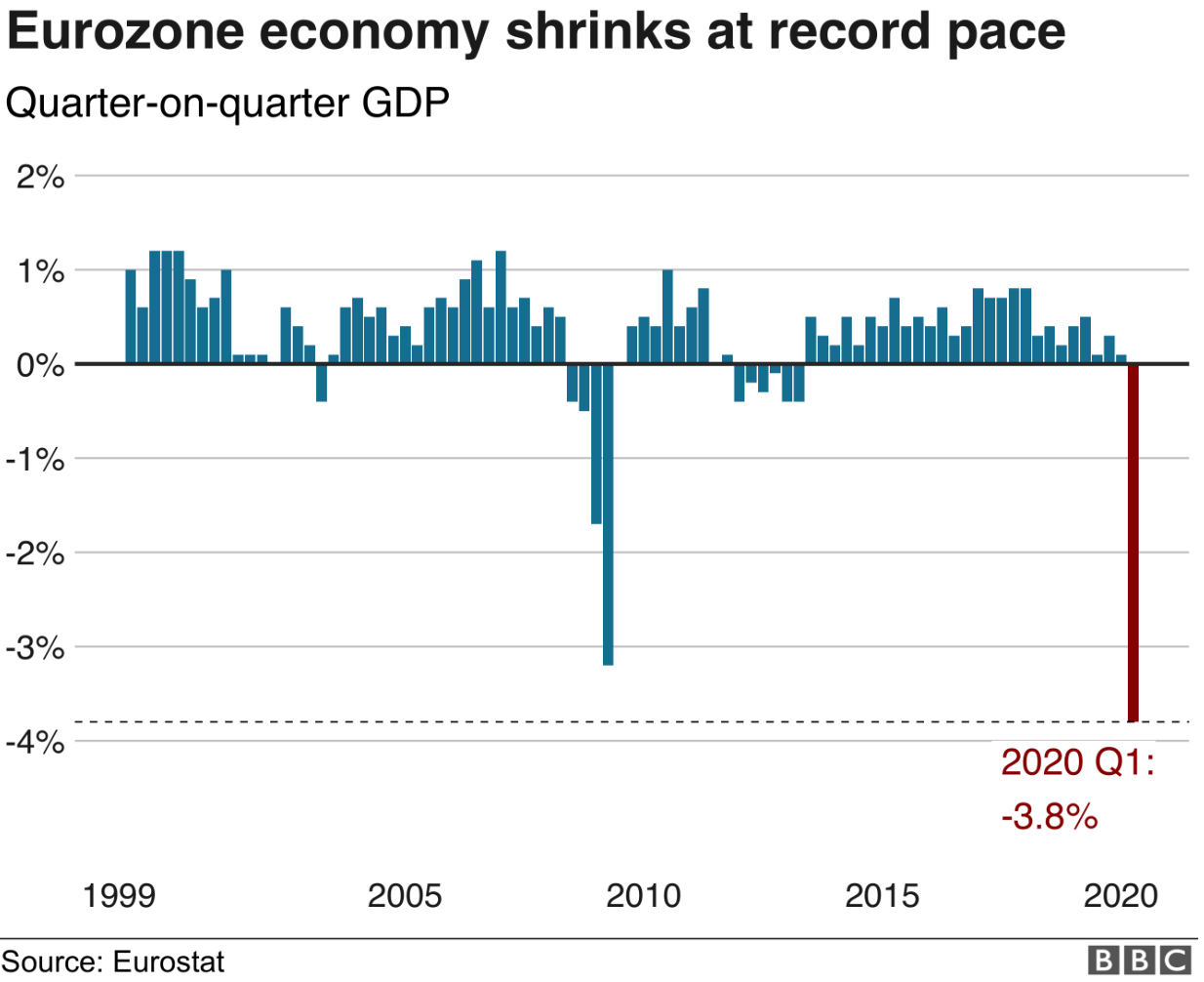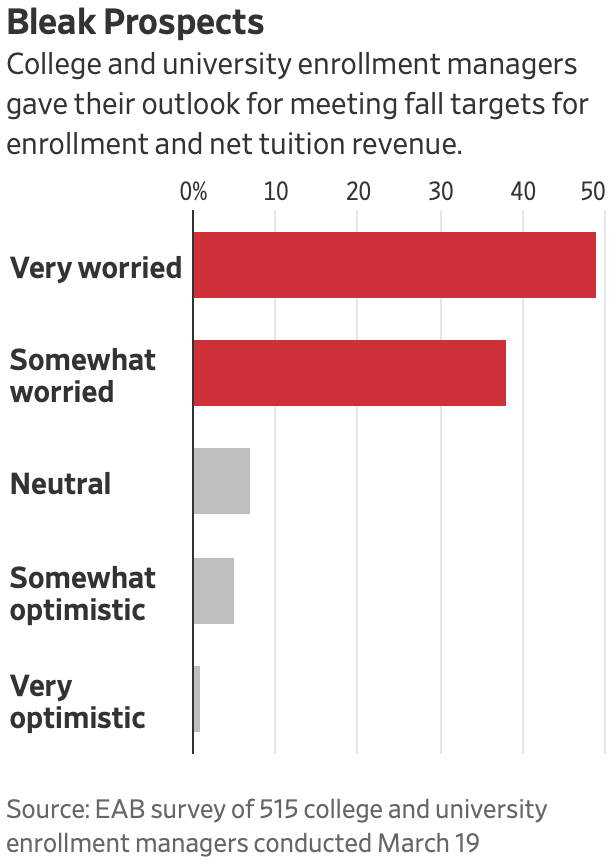The World
3.8 million more workers filed for unemployment benefits last week. That’s probably an undercount. Meanwhile, consumer spending fell 7.5% in March, its steepest monthly decline since 1959. (New York Times, Wall Street Journal)

Federal Reserve Chair Jerome H. Powell said U.S. job losses are “heartbreaking” and “urgent response” is needed, while the Fed left rates unchanged near zero and suggested it would not be raising them anytime soon. Powell indicated a “W-shaped” recovery may be too optimistic. (New York Times, Reuters)

The eurozone economy shrank at the fastest rate on record in the first quarter, as GDP contracted 3.8%. France’s 5.8% decline was largest the quarterly series has recorded since it began in 1949. Spain fell 5.1%, while Italy's economy shrank by 4.7%. (BBC News)

How did the U.S. get Saudi Arabia to end its oil price war with Russia? In an April 2 phone call, President Trump threatened to upend a 75-year strategic alliance, telling Saudi Crown Prince Mohammed bin Salman that unless OPEC cut oil production, he would be powerless to stop lawmakers from passing legislation to withdraw U.S. troops from the kingdom. (Reuters)
A key gauge of Russian manufacturing slumped to the lowest level since records began in 1997. A 15% slump in the ruble against the dollar this year has created an additional burden for factories that rely on imported goods. (Bloomberg)
President Donald Trump believes China’s handling of the coronavirus is proof that Beijing “will do anything they can” to make him lose his re-election bid in November. China denies it. (Reuters, South China Morning Post)
Global carbon emissions are set to drop a record 8% this year because of lockdowns to protect people against the coronavirus pandemic. The International Energy Agency projects the fall will be six times larger than the previous record in the 2008 recession. (BBC News)
A COVID-19 vaccine from BioNTech and Pfizer could be available for emergency use by October -- several months ahead of a J&J vaccine and just off the pace of vaccines from Oxford’s Jenner Institute and an undisclosed Chinese entity. (BioCentury)
U.S. colleges are being pushed to the breaking point as forecasted declines in enrollment and revenue trigger spending cuts and salary freezes: “The world order has changed.” (Wall Street Journal)

Amazon, Whole Foods, Instacart, and Target workers have organized a mass strike on May 1, as workers ask customers to boycott the stores and services. (Vice)
Jeff Bezos and Elon Musk win contracts for spacecraft to land NASA astronauts on the moon. (Washington Post)
Economy
Barclays CEO Jes Staley suggests that office buildings may be obsolete, and says bank staff will not revert fully to its pre-January working habits: “The notion of putting 7,000 people in a building may be a thing of the past,” he said. (Reuters)
Private equity firms are caught in coronavirus valuation limbo. Funds that raised initial capital through a first closing face a slow road to the finish line as investors scrutinize the valuations of early deals. (Wall Street Journal)
Shell cut its dividend for first time since WWII. Meanwhile, Chesapeake Energy Corp, which was at the forefront of the U.S. shale boom, is preparing a potential bankruptcy. (CNN, Reuters)
JetBlue, Delta seek U.S. approval to suspend flights to 25 U.S. airports. (USA Today)
Starbucks expects to begin reopening its stores next week and plans to have 90% of its US company-owned locations operating by June. (CNN)
Technology
Zoom admits it doesn’t have 300 million daily active users. The difference between a daily active user (DAU) and “meeting participant” is significant. Daily meeting participants can be counted multiple times: if you have five Zoom meetings in a day then you’re counted five times. Zoom shares dropped as much as 8.7% on Thursday. (The Verge, CNBC)
AMC Theatres said it will boycott Universal Pictures movies at its cinemas after the studio suggested it would pursue online releases for more films after the streaming success of “Trolls World Tour.” (Los Angeles Times)
Data show that Covid-19 has caused a major spike in anti-Chinese and anti-Semitic hate speech. (New Statesman)
Through improved dialogue features, Facebook says its new chatbot beats Google’s as the best in the world and open-sourced the AI system to spur further research. (MIT Technology Review)
Nearly half (46%) of American consumers say they've already run out of media content to watch, read or listen to, up from 30% in March. Additionally, 51% say they are limiting their time with media to avoid it, up from 37% in March. (MediaPost)
Smart Links
How do we keep students from cheating on online exams? (Inside Higher Ed)
Anxious about public speaking? Alexa can help. (Science Daily)
Penn researchers test if dogs’ keen sense of smell can screen humans for the coronavirus. (Philadelphia Inquirer)
Can Missouri sue China? (South China Morning Post)
Bizarre Spinosaurus makes history as first known swimming dinosaur. (National Geographic)
Over 80 percent of Georgia's hospitalized covid-19 patients have been black. (CDC)
NCAA board supports student-athlete endorsements. (NBC Sports)
Good News
Bay Area food banks get a coronavirus surprise: 35,000 Wagyu steaks worth $2 million, delivered from Idaho’s Snake River Farms. (San Francisco Chronicle)
How ‘Betty the Weathercat’ became a TV news star in Indiana. (Washington Post)
Disneyworld’s closed. So what do you get when you’re World Series Champion? Ryan Zimmerman scored an interview with Dr. Anthony Fauci:
Thanks for reading. Did you like the newsletter? Why not subscribe now?


